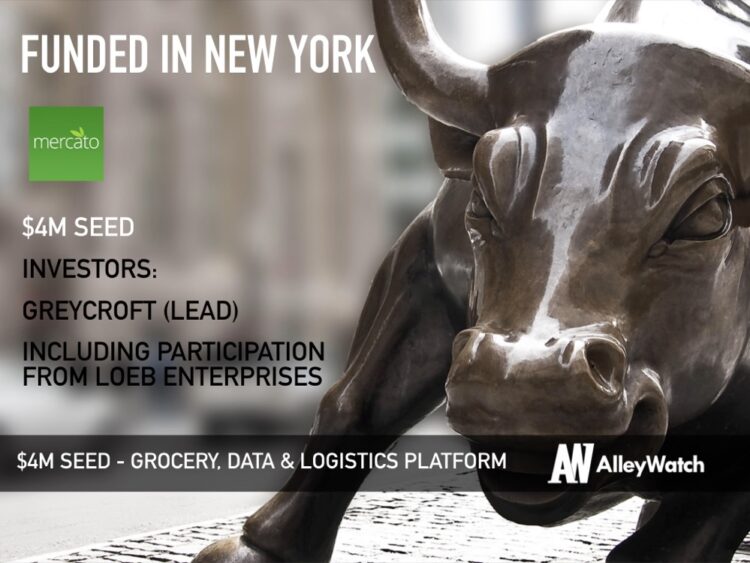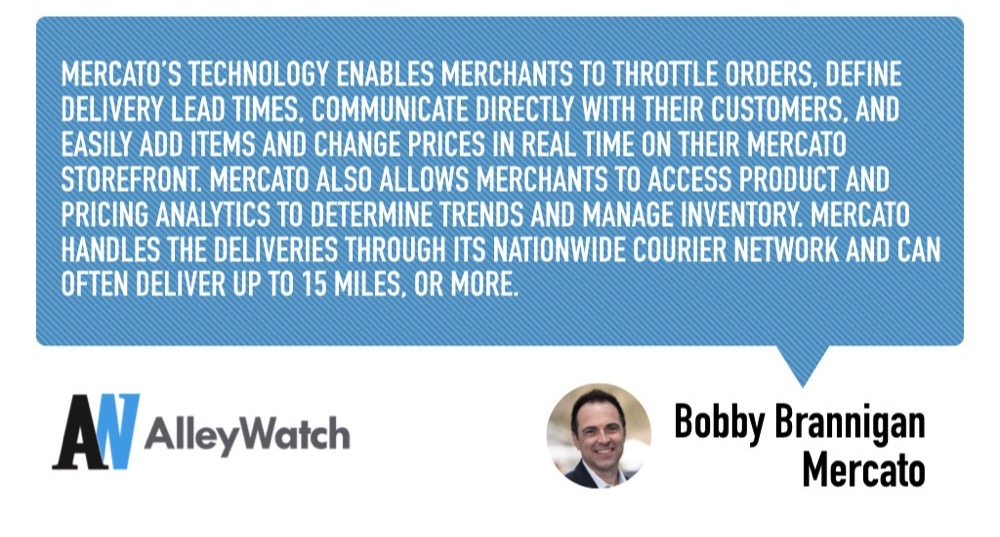Independent grocery stores are facing challenges due to the rise of online grocery platforms, national grocery chains, and apps like Instacart. Mercato empowers independent grocery stores by leveraging technology into their operations to provide capabilities similar to the chains. Specifically designed to meet the needs of independent grocery stores and specialty food retailers, the platform serves as an online ordering and delivery platform with added features such as product and pricing analytics to determine trends, and inventory management. Mercato is already being used in 750+ independent grocery stores throughout the country.
AlleyWatch sat down with Mercato cofounder and CEO Bobby Brannigan to learn more about how the inspiration for Mercato came from his own personal experience as the son of an independent grocer, the company’s future plans, and latest funding rounds, which brings the company’s total equity funding to $8.7M.
Who were your investors and how much did you raise?
Greycroft, Loeb Enterprises, and others. This was another round of seed funding for us. The round is for $4M.
Tell us about the product or service that Mercato offers.
Mercato is an online ordering and delivery platform for independent grocers. It was created to help them to compete with local and national grocery chains online. This is incredibly difficult for independents, as they are at a huge disadvantage in terms of people, technology, and money. As a result, they are being squeezed in every direction. Mercato is helping to level the playing field by giving independent grocers access to world-class tools such as e-commerce services, marketing support, customer analytics, local delivery, product recommendations, and more.
 What inspired you to start Mercato?
What inspired you to start Mercato?
My father owns a neighborhood grocery store in Brooklyn, New York. I spent my childhood watching him run his small business, and saw firsthand the long hours, responsibility and pride he had when turning the key on the front door every morning. As a kid, I learned the systems of the store. Sales and inventory management were primarily tracked on paper. Supplier partnerships were based on handshakes. I began integrating new ways to create efficiencies and increase revenue for the store. I developed a system to track phone orders and deliveries, as well as a computerized inventory system. My dad continued to do business with a handshake, but the processes I created helped the store to remain competitive in a changing business environment.
Soon after I went off to college, and as a sophomore at State University of New York at Fredonia in 2002, I founded ValoreBooks with four other students. It helped solve a challenge every college student faces: the high cost of textbooks. The company grew to be one of the internet’s largest online textbook marketplaces with $85M in sales and was later acquired by SimpleTuition, then the largest online college lending marketplace in the country.
We took the processes I developed for my father’s store and combined them with what we learned from ValoreBooks to create the Mercato platform. Our goal is to level the playing field for independent grocery stores who are competing against the titans of online grocery delivery and large supermarket chains.
How is Mercato different?
What differentiates Mercato from other online grocery companies is that our platform was designed specifically to meet the unique e-commerce needs of independent grocery stores and specialty food retailers.
Mercato’s technology enables merchants to throttle orders, define delivery lead times, communicate directly with their customers, and easily add items and change prices in real time on their Mercato storefront. Mercato also allows merchants to access product and pricing analytics to determine trends and manage inventory. Mercato handles the deliveries through its nationwide courier network and can often deliver up to 15 miles, or more.
Currently, Mercato has 750 independent grocery retailers on our platform in markets throughout the country.
What market does Mercato target and how big is it?
Independent Grocers. These 20,000+ stores across the U.S. bring in $131B in annual sales according to National Grocers Association.
Who do you consider to be your main competitors?
Though their models are different than ours (we cater to independent grocers and don’t use outside shoppers to pick groceries), Instacart and Shipt might be considered competitors. Another competitive factor is independent grocers that may not yet realize that being online is a necessity and table stakes today. However, this is changing…as it becomes more obvious that being online is a requirement.
What’s your business model?
Our #1 priority is to generate incremental sales for our partner grocers. We do this by getting their entire store online and then using multiple cutting-edge marketing strategies to help expose them to new customers and generate sales.
We charge merchants a percentage of these sales as commission. This way, we are tied directly to their success and vice versa.
We also are launching some additional services such as product discovery and recommendations as well as creating a supplier marketplace where we will be able to introduce our merchants to great suppliers with pre-negotiated pricing and one click ordering. These will be charged as optional services.
What was the funding process like?
All funding processes are challenging and ours was fairly typical. We had conversations with dozens of potential investors which led to fewer in-person meetings, mostly in NYC and the Bay area. Eventually, we were really fortunate that our #1 target partner, Greycroft, committed to leading our round. They have amazing experience with companies in the food space, and we are confident they will be a great growth partner for us.
What are the biggest challenges that you faced while raising capital?
Again, the typical things—occasionally, unreturned calls and emails or some people fell off as discussions progressed but didn’t really close the loop. Really though, we found the experience to be positive, in that we were treated with respect and got great feedback from most of the companies with which we had in-depth discussions.
Obviously, the biggest overall challenge is just getting that first firm to commit to leading the round and setting a price that feels right to our shareholders.
What factors about your business led your investors to write the check?
Our focus on independent grocers, who are really underserved, and intimate knowledge of the industry and the tools they need to best compete with the big guys, as well as our passion for the industry—were all positive contributors. We’ve also had really strong growth over the last year.
Our focus on independent grocers, who are really underserved, and intimate knowledge of the industry and the tools they need to best compete with the big guys, as well as our passion for the industry—were all positive contributors. We’ve also had really strong growth over the last year.
I think it also helps that many of the members of our team already worked intimately at our last company, ValoreBooks, which had a successful exit and somewhat similar business model.
What are the milestones you plan to achieve in the next six months?
We plan to increase employees to dramatically expand our market base of over 750 independent grocers across the U.S.
Of course, we will increase sales and marketing, and further develop tools and services for grocery retailers to give them an edge.
What advice can you offer companies in New York that do not have a fresh injection of capital in the bank?
Start-ups are all about scrappiness and vision. You need to have a team of people, even if that is a team of 1, who are willing to do what it takes to be successful without taking an eye off of where you are going as a company. That can be a hard balance.
It also helps to have an amazing team, if you have that luxury. The better the people around you, the more you can have people working to leverage the vision without everything relying on you personally.
Lastly, I’ve had a lot of success in my career simply by being willing to meet with and help other entrepreneurs. This networking leads to a lot of great connections and opportunities to create win-win opportunities over time.
Lastly, I’ve had a lot of success in my career simply by being willing to meet with and help other entrepreneurs. This networking leads to a lot of great connections and opportunities to create win-win opportunities over time.
Where do you see the company going now over the near term?
We’ll continue to make it easy for independent grocers to compete online and to capitalize on their biggest strengths in providing superior quality and service. We will be giving independent grocers new tools, like product and pricing analytics to determine products consumers in their area are looking for, gain buying power, and better manage inventory to give them an edge.
We are confident that we have the best solution in the market for independents and just need to spread the word.
What’s your favorite restaurant in the city?
Ribalta on E12th street





